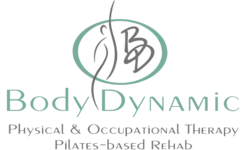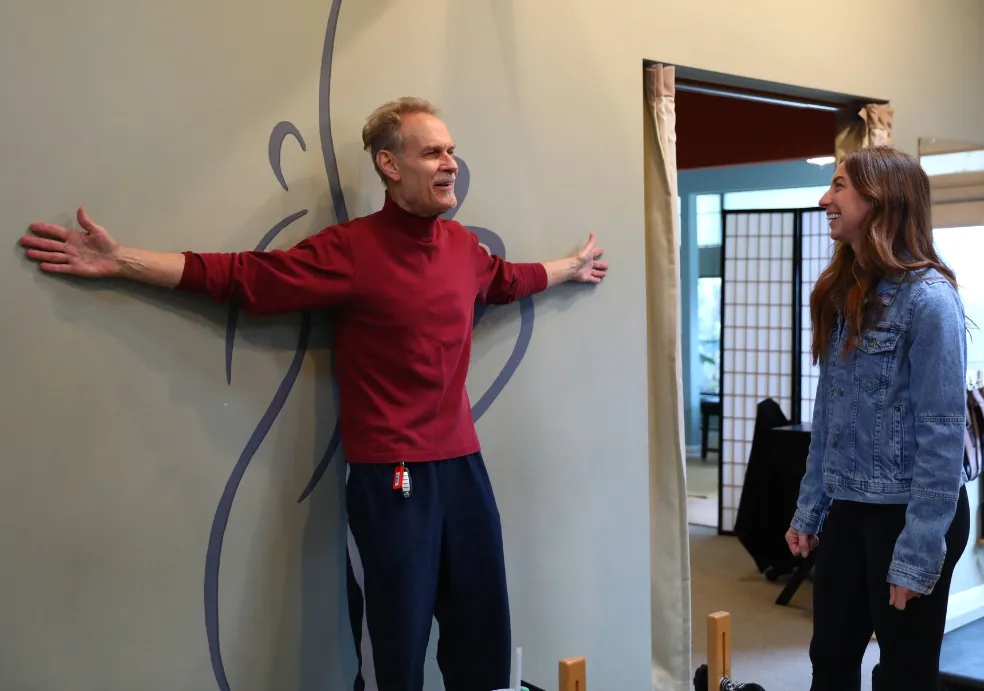Rotator Cuff Tear in Clarks Summit
Rotator Cuff Tear Physical Therapy in Clarks Summit
Do you experience pain, limited mobility, and weakness in your shoulder? Have you sustained an injury or tear in your rotator cuff muscles and tendons? At Body Dynamic, our physical therapists provide customized rehabilitation programs to reduce discomfort, restore strength and range of motion, prevent surgery, and facilitate long-term healing for rotator cuff tears.
A Targeted Approach to Healing Rotator Cuff Injuries
Rotator cuff tears can greatly hamper your quality of life, causing sharp pain, stiffness, and lack of function that interferes with everyday tasks, fitness, work duties, and recreation. Without proper treatment, symptoms may persist or worsen over time.
Our experienced physical therapists offer comprehensive assessments, personalized treatment plans, and engaging one-on-one care to meet your specific needs. We incorporate the latest evidence-based techniques to alleviate discomfort, improve biomechanics, and strengthen the muscular support around your shoulder joint.
Patients choose our rotator cuff tear rehabilitation services to:
- Receive thorough evaluations and customized programs from highly trained therapists
- Reduce pain and inflammation through targeted modalities and manual therapy
- Regain comfort, strength, and mobility in their injured shoulder
- Learn proper movement patterns and exercises to continue recovery
- Avoid invasive surgical procedures by healing tears effectively
- Resume daily routines, job tasks, sports, and other activities pain-free
If limited function and lingering shoulder pain are diminishing your quality of life, our rotator cuff tear physical therapy may facilitate the healing and strength you need to thrive again.
What Makes Our Rotator Cuff Tear Rehab in Clarks Summit Stand Out
At Body Dynamic, we recognize that every patient and injury is unique. Our rotator cuff tear physical therapy provides tailored one-on-one care centered around your lifestyle and goals. We offer:
Comprehensive Evaluations
Using specialized assessments and mobility testing, our therapists pinpoint the exact nature and severity of your rotator cuff injury for personalized programming. We examine aspects like:
- Location and size of muscular/tendon tears
- Shoulder range of motion and strength deficits
- Pain levels and functional limitations
- Postural habits, muscle imbalances, and movement dysfunction
Detailed intake allows us to craft the optimal combination of therapeutic exercises, hands-on techniques, and modalities to meet your needs.
Individualized Treatment Plans
No two rotator cuff tears present exactly alike. That’s why we design rehab plans tailored to your injury status, symptoms, functional goals, and more.
Custom components may include:
- Gentle shoulder mobilization and stretching
- Targeted strengthening for rotator cuff and surrounding musculature
- Neuromuscular re-education for proper movement patterns
- Manual therapy for enhanced joint mobility and pain relief
- Use of modalities like ultrasound, electric stimulation, or ice
- Progressive home exercise programs for continued recovery
We modify our rotator cuff therapy over time based on your response and feedback.
One-on-One Care & Education
Through consistent one-on-one sessions, our therapists develop trusted relationships with patients while providing hands-on care.
We educate you on topics like:
- Anatomy of the shoulder complex
- Stages of tissue healing
- Optimizing posture and joint biomechanics
- Avoiding re-injury through movement modifications
- Signs your program needs adjustment
Our patients appreciate having an expert guide to explain their injury and empower them to participate in their own recovery journey. Regain comfort and strength in your shoulder through tailored rotator cuff rehabilitation with Body Dynamic. Our patient-centered services facilitate optimal healing based on your unique needs.
Frequently Asked Questions About Rotator Cuff Tear Physical Therapy in Clarks Summit
We understand you likely have several questions about pursuing physical therapy for a rotator cuff tear. Below we address some of the most common inquiries we receive:
How do I know I tore my rotator cuff?
Common symptoms signaling a potential rotator cuff tear include:
- Persistent shoulder/upper arm pain, especially at night or with overhead motions
- Significant loss of shoulder strength and range of motion
- Clicking, cracking, or popping sounds in the shoulder
- Difficulty completing routine movements like brushing hair or reaching behind the back
Schedule an appointment with one of our therapists for definitive rotator cuff tear testing and diagnosis. We perform assessments to pinpoint the injury location and severity to guide appropriate treatment.
How do you fix a rotator cuff tear?
Smaller tears often heal through conservative physical therapy emphasizing tissue rest, gentle shoulder mobilization, anti-inflammatory modalities, and gradual strengthening exercises.
Larger, full-thickness tears may require surgery to suture tendon edges together before undergoing more rigorous post-op physical therapy. If tears are left untreated, available treatment options become more limited over time.
Our therapists collaborate with referring physicians to determine the optimal treatment protocol for each patient based on exam findings and tear characteristics.
Can a rotator cuff tear heal on its own?
While very small rotator cuff tears may heal spontaneously over time, the majority require proactive treatment to stimulate tissue regeneration and functional recovery. Leaving tears unchecked allows inflammation and dysfunction to persist, risking larger future tears.
Through manual techniques, specific exercises, and modalities, our physical therapists create optimal healing environments to actively encourage rotator cuff repair. We help patients avoid unnecessary imaging, injections, or surgery if tears respond well to conservative care.
How long does a rotator cuff tear take to heal with physical therapy?
Healing times vary significantly based on tear size, location, chronicity, patient age, and additional complicating factors. On average, patients attend therapy for 6-12 weeks depending on severity. Smaller tears often resolve quicker, while larger tears require 3+ months of rehab even post-surgery. We tailor your program’s duration to facilitate tissue repair while restoring strength and function milestones. Your therapist will discuss expected recovery phases and timelines during initial evaluations.
Meet Our Passionate Rotator Cuff Tear Rehabilitation Team in Clarks Summit
At Body Dynamic, our close-knit team shares a passion for guiding patients to renewed shoulder health and an active lifestyle. Our rotator cuff tear specialists include:
Donna Sokolowski, PT, specializing in Vestibular Disorders, Concussion Management, and Graston Technique
With 30+ years of outpatient orthopedic experience, Donna pursues advanced training in manual therapy and sports rehabilitation. She takes a movement-based approach to healing rotator cuff pathology.
We welcome you to visit our state-of-the-art facility for a rotator cuff injury assessment or rehabilitation session at your convenience. Our staff looks forward to helping you finally resolve lingering shoulder pain and dysfunction.
Take Control of Your Shoulder Healing Today
If rotator cuff injury symptoms like sharp pain, stiffness, and lost function are negatively impacting your daily life, Body Dynamic can help facilitate healing and renewed comfort. Our personalized physical therapy programs reduce discomfort, restore flexibility and strength, enhance biomechanics, and set you up for long-term shoulder health. To get started, contact our Clarks Summit clinic today or request an appointment online for an initial evaluation. Our compassionate therapists are ready to listen and craft customized rotator cuff tear rehab to get you feeling like yourself again.
About The Author
Donna Sokolowski, PT, has been a physical therapist for over 30 years. She’s excellent at making exercises that can get boring feel fun and interesting. Donna loves seeing her patients quickly get better with problems like feeling dizzy, moving smoothly, seeing clearly, thinking sharply, and managing pain, as long as they’re doing the right exercises. Her patients often say she’s great at listening and explaining things in a way that’s easy to understand.



